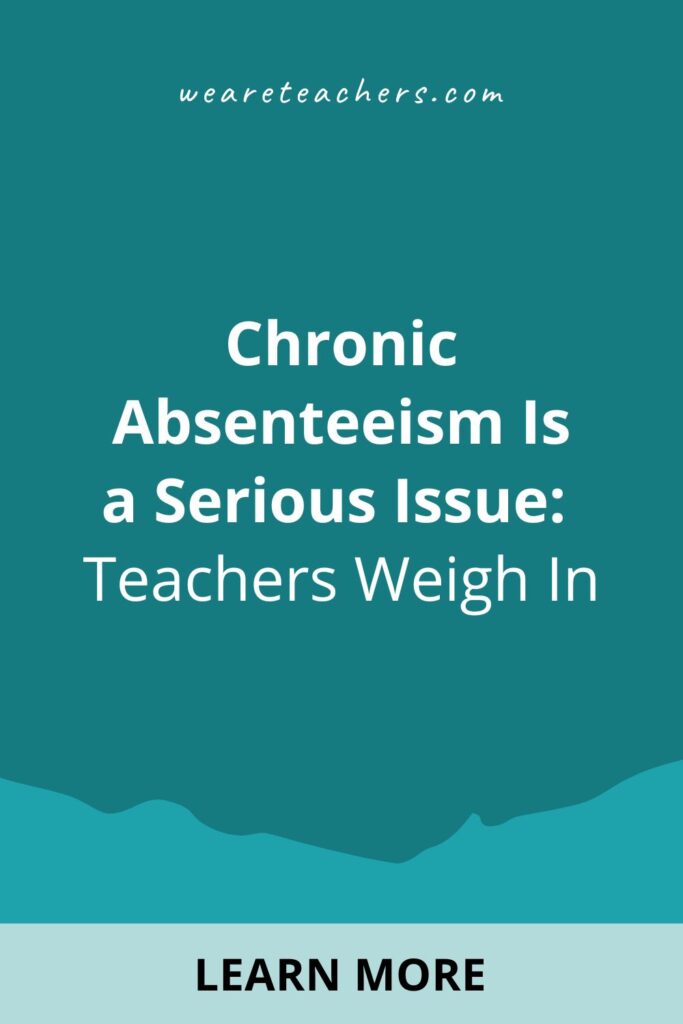Faculties face lots of challenges today. Lack of funding, trainer shortages, curriculum restrictions, and basic security considerations make educating college students tougher than ever. One of many largest issues doesn’t at all times get the eye it deserves: persistent absenteeism. Numbers of habitually absent college students have skyrocketed in the previous couple of years, and nobody appears to know fairly what to do about it.
We surveyed practically 300 lecturers to listen to about their experiences with persistent absence within the classroom. A whopping 75% of them acknowledged that persistent absence is a serious problem of their college or district. They shared story after story of scholars lacking college and falling additional and additional behind. Many pointed to the necessity for deeper connections with households, stronger relationships with college students, and extra help for addressing emotional and behavioral challenges. Applications like Aware Self-discipline, which provide trauma-responsive skilled improvement and implementation instruments for constructing inclusive college communities, could also be a part of the answer.
Right here’s what we discovered.
What’s the definition of persistent absenteeism?
Typically, persistent absenteeism is outlined as lacking 10% or extra days of college in a yr. For a district with a 180-day yr, this works out to 18 days, or round two days monthly. It might probably additionally consult with college students who’re habitually considerably tardy, lacking substantial elements of the college day.
Most chronically absent college students miss way over two days monthly, although. In lots of circumstances, it’s extra like two to a few days per week. In these circumstances, the detrimental results grow to be so nice that they’re laborious to beat, even with intervention.
What number of college students are chronically absent?
The numbers for persistent absences range extensively from district to district and state to state. In locations like Alaska and Washington, D.C., colleges report a persistent absence price as excessive as 45%. In areas with decrease incidences, like New Jersey and Virginia, the numbers are at about 16%. On common throughout the nation, round one in three college students are repeatedly absent from their school rooms.
What about truant officers?
Opposite to standard opinion, truancy officers don’t simply roam the streets on the lookout for children who skipped college that day. First, it’s essential to notice that truancy refers to unexcused absences solely, whereas persistent absenteeism contains absence for any motive. So, if a father or mother stories their baby sick every time, or notifies the college that they’ll be taking their baby out for a number of weeks for a protracted trip, these absences typically wouldn’t qualify as truant.
Every state has its personal truancy legal guidelines, which normally require an accumulation of unexcused absences in a specified time period earlier than the authorized system will get concerned. This requires lots of paperwork and documentation by lecturers and colleges. And lots of educators notice that authorized truancy intervention usually has little impact.
Take this story from one Kansas trainer: “I had a pupil who missed 110 days of college in her seventh grade yr however was handed on to me in eighth grade. She had been turned in to the truancy officer in sixth grade and in eighth grade. Her youthful brother was a sixth grader the yr she was in eighth grade. Nothing appeared to work for her or her brother’s attendance points. Neither baby might learn or write. … In her eighth grade yr, that pupil missed 112 days of college and she or he was nonetheless handed on to ninth grade.”
What impact has COVID-19 had on persistent absence?
In March 2020, COVID-19 pressured colleges to shut their doorways and ship college students house to study on-line for the remainder of the college yr. The uncertainties of the pandemic made 2021-2022 the worst yr for persistent absence ever, with numbers practically doubling from 15% to twenty-eight%. This isn’t essentially shocking. What’s regarding is that in 2022-23, persistent absence charges remained a lot larger than pre-pandemic ranges, and the development continued into 2024.
“Ever since COVID, I’ve seen extra college students in a position to speak their dad and mom into simply letting them keep house, or refusing to go,” observes a Virginia trainer who’s been within the classroom for 30+ years. “Dad and mom give in too simply after which report back to the college that their pupil ‘simply wouldn’t go and there was nothing I might do.’”
It’s not simply anecdotal—the numbers show it. A examine by the American Enterprise Institute discovered that persistent absence numbers are actually 75% larger than they have been earlier than COVID hit. (Check out state-by-state numbers right here.)
How does being chronically absent have an effect on college students?
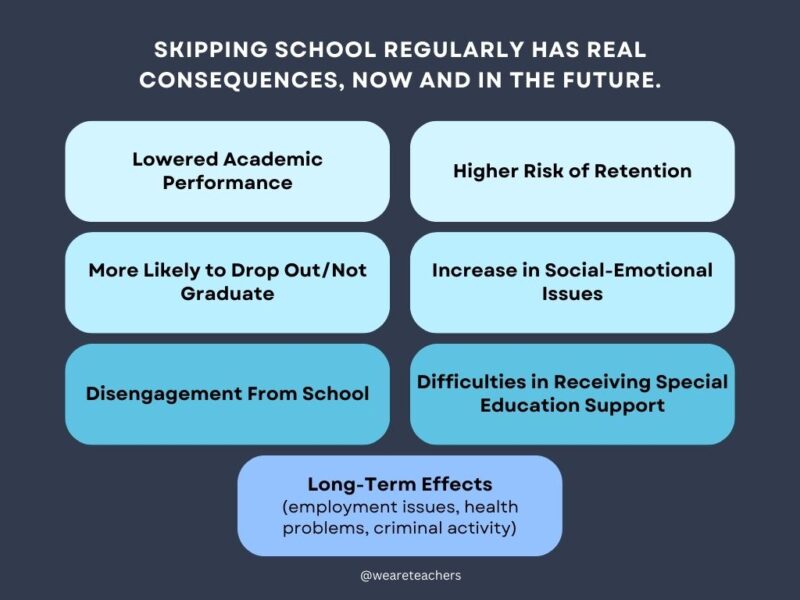
As you may think, lacking class repeatedly has an unlimited impression on college students, and failing grades are only one a part of it. Right here’s a better have a look at the results of persistent absenteeism.
Lowered Educational Efficiency
For a lot of educators, the priority isn’t a lot a failing grade as the general lack of ability accumulation and development. “A lot of the college students I see which have persistent absenteeism get thus far behind they merely can’t catch up, even with individualized assist,” says Alicia H., a highschool particular ed trainer.
Kate P., a Ok-2 studying trainer, confirms this. “They only fall additional and additional behind academically. Additionally they are inclined to get out of the routine and have a more durable time getting again into the swing of issues within the classroom.”
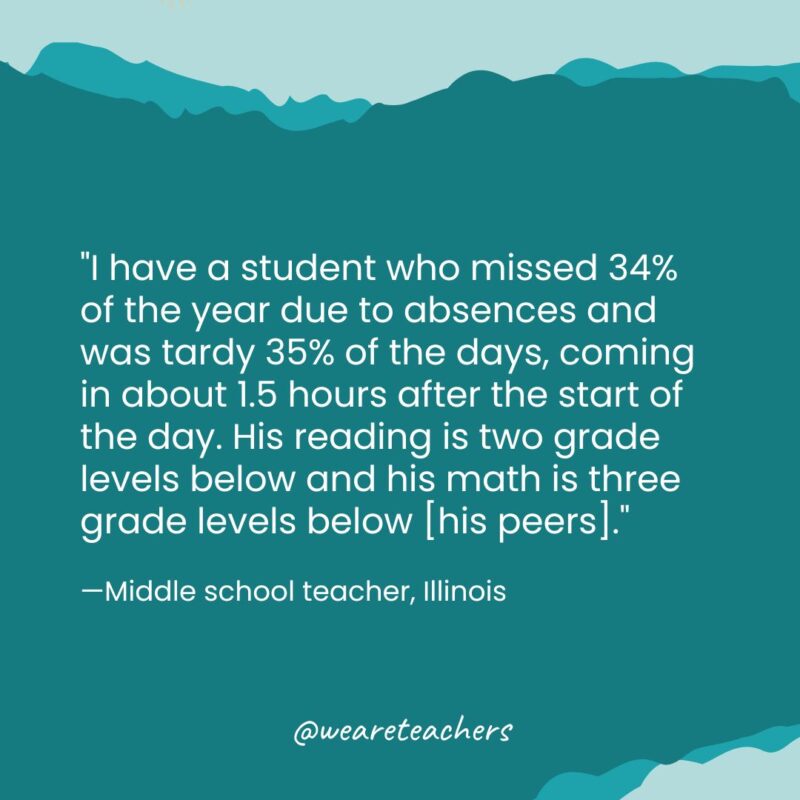
Continual absence will be particularly detrimental within the elementary years, when children are studying elementary tutorial and social abilities. “I’ve a pupil who final yr missed 34% of the yr resulting from absences and was tardy 35% of the times, coming in about 1.5 hours after the beginning of the day,” an Illinois center college trainer relates. “He’s nearly by no means sick—he simply doesn’t need to come to high school and his mother lets him keep house. His studying is 2 grade ranges beneath and his math is three grade ranges beneath [his peers].”
Increased Danger of Retention
Not surprisingly, this tutorial impression means college students are at a a lot larger threat of being held again. One trainer shared the story of a household with 4 kids, all chronically absent. Two of those kids needed to be retained not less than as soon as as a result of problem.
Extra Seemingly To Drop Out or Be Unable To Graduate
When college students maintain falling additional and additional behind, college turns into such a chore that they merely hand over. These children are more likely to drop out of highschool earlier than ending; college students with only one yr of persistent absenteeism are seven occasions extra more likely to drop out earlier than commencement.
Even when a pupil can sustain with their work, college attendance insurance policies can imply they’re nonetheless not eligible to graduate. “I had a pupil who got here two days in the beginning of the semester and 4 days on the finish of the semester and needed to finish all her work within the 4 days,” says one New York trainer. “It was unattainable for her to make up all of the work. She was a senior and she or he missed out on so lots of the enjoyable experiences as a result of she was absent. She then cried to me about how she won’t be capable of graduate.”
Enhance in Social-Emotional Points
Lacking college is about greater than falling behind in teachers: It might probably even have a big effect on social-emotional points. That very same New York trainer explains, “When they’re absent, they miss out on social actions, speaking to buddies, listening to conversations inside class that can’t at all times be made up. They don’t ever study perseverance and the way to full issues even if you don’t actually really feel prefer it. They then do the identical factor at a job and don’t perceive why the employer is mad and fires them.”
Virginia seventh grade trainer Crystal J. gave this instance: “We had a pupil that had persistent absenteeism,” she says. “Thankfully, he was sensible sufficient that he might sustain together with his work and grades. The draw back was that he had restricted social abilities and excessive anxiousness. Had he been in class, he would have been extra snug with different college students and his lecturers. This is able to have helped his anxiousness and social abilities.”
Applications like Aware Self-discipline are designed to assist colleges create emotionally secure environments and help college students in creating self-regulation and connection abilities—each of which might scale back anxiousness and improve college attendance.
Disengagement From College
Prolonged absences make it laborious for college kids to attach with their friends and lecturers. As a consequence, they lose curiosity in class, which feeds extra persistent absence conduct.
“A pupil was out for 4 weeks, and in that point, a brand new pupil enrolled in our room, we adjusted our every day schedule, and moved furnishings across the classroom,” preschool trainer Ok. Hylden advised us. “This pupil was very excessive academically, and he loved speaking with buddies and collaborating in school.
“Upon his return, the adjustments have been overwhelming to him. He turned withdrawn, his buddies had joined new social circles, and the room felt unfamiliar to him. It took a pair weeks for his partitions to come back again down, and though his teachers remained excessive, his social-emotional world was rocked by the adjustments. I met together with his dad and mom and mentioned that though he might nonetheless recite his letters and rote rely, lacking out on a lot classroom time and alter dysregulated his core, and he wasn’t having fun with college anymore. With time, he did readjust, and his absences decreased.”
Difficulties in Receiving Particular Schooling Help
Faculties at the moment usually have strong particular education schemes, offering lodging and variations for college kids for a wide range of bodily and tutorial variations. However in an effort to be assessed for these applications, children must be in class persistently. In any other case, it’s laborious to find out if their points are brought on by a necessity for particular schooling providers, or are simply the results of lacking an excessive amount of instruction. A number of lecturers in our survey shared tales of youngsters who desperately wanted particular schooling intervention however didn’t qualify due to persistent absenteeism.
Lengthy-Time period Results
Continual absence is a number one indicator of highschool drop-out, which has been linked to poor labor market prospects, diminished well being, and elevated involvement within the felony justice system. College students who’re chronically absent are at larger threat for these opposed outcomes. In different phrases, persistent absence can have an effect on college students lengthy after their college years are over.
What causes persistent absenteeism?
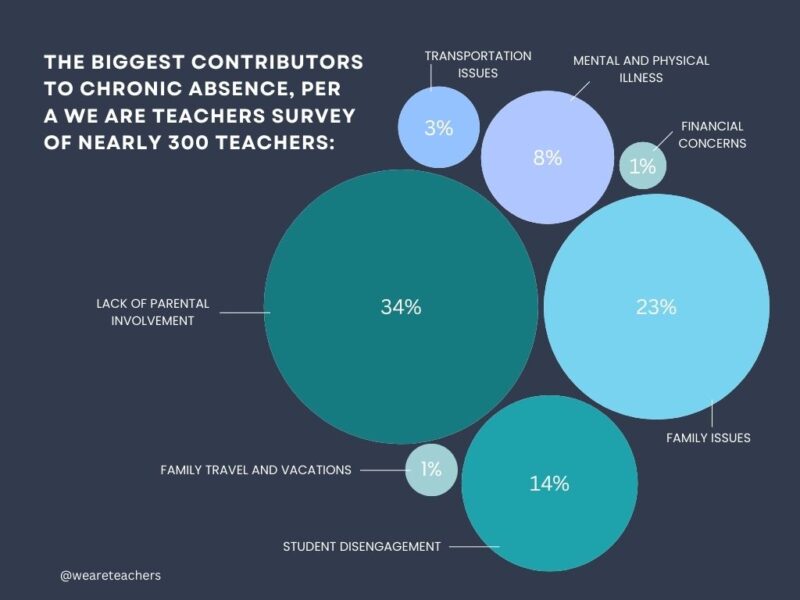
Our survey of just about 300 educators confirmed that folks and households have a serious impression on whether or not college students are absent repeatedly. Practically 60% of respondents stated that complicated house lives and lack of parental involvement have been the largest causes.
Others pinpointed an absence of curiosity on the a part of college students, well being points (normally associated to psychological well being), and transportation challenges. Many, particularly in wealthier districts, complained that folks repeatedly pulled their children out of college for journey and household holidays mid-year. Educators fear {that a} lack of penalties and total feeling that faculty simply isn’t that essential are persevering with to gasoline the fireplace.
Lack of Parental Involvement
Greater than a 3rd of these we surveyed particularly known as out dad and mom relating to persistent absences. Time and again, they shared tales of oldsters who gained’t or can’t assist their baby make it to high school.
“College students who’re chronically absent usually wouldn’t have dad and mom which can be very concerned of their schooling,” a New Mexico 2nd grade trainer notes. “These are the dad and mom which can be troublesome to get ahold of and don’t come to high school occasions or parent-teacher conferences.”
Some dad and mom simply aren’t keen (or ready) to make their kids cooperate. In response to an Indiana trainer: “College students within the higher grades problem dad and mom about attending college, and I really feel that some dad and mom would fairly name them in sick than struggle to get them to high school.”
Household Points
In lots of conditions, educators notice that chronically absent college students are sometimes those that are answerable for getting themselves up and off to high school within the morning. This is actually because their dad and mom have already left for work, although typically the dad and mom merely select to not stand up themselves. “I had a pupil—very, very brilliant—be tardy over 40 occasions resulting from mother not getting up on time. She missed a lot and it made her really feel rushed within the morning. Simply losing her potential,” laments an Alabama 1st grade trainer.
Different households want their baby to remain house to observe youthful siblings, or wrestle financially so older children skip college to work as an alternative. Some are unhoused, dwelling in shelters and even on the streets. Dad and mom might wrestle with psychological or bodily well being issues, making house life chaotic and unregulated. College falls by the wayside as these households simply wrestle to get by.
Scholar Disengagement

For some children, the thought of getting an schooling and graduating merely isn’t sufficient to make them need to go to high school. They may argue that their required courses aren’t actually getting ready them for “actual life,” or really feel it simply doesn’t matter anyway. “Engagement is a large motivator,” explains a Kansas studying trainer and librarian. “We encourage all our college students to become involved with actions, athletics, and golf equipment. I’ve many college students say that their music courses gave them a motive to come back to high school or that staying eligible to play sports activities made them present up and get their work completed.”
Well being Points
Well being considerations, usually associated to psychological well being, are one other huge reason behind persistent absenteeism. An Iowa trainer shares: “I had a pupil who had such excessive anxiousness that every day, his goal was to get house. He, as a third grader, would cry every morning after which maintain telling me he had a stomachache. I believe he did work himself up into having a stomachache. However he was used to being appeased, and his efforts made his mother really feel responsible and unhappy for him, so she typically gave in to his needs.”
Practically 14% of school-age kids are recognized with anxiousness and/or melancholy issues, and the quantity appears to extend yearly. That is more likely to grow to be an excellent greater reason behind persistent absence except we take motion to handle the difficulty.
Transportation Challenges
A small however significant slice of scholars face challenges making their solution to college daily. Generally it’s as a result of they stand up late and miss the bus. Different occasions, they reside out of the vary of college or public transportation. These children depend on dad and mom to make preparations to get them to high school, and their dad and mom don’t at all times observe by way of.
“I had a 4th grade boy who missed about 2 days each week (typically extra) as a result of the household lived an hour away from our faculty,” a California elementary trainer advised us. “His mom labored at an area hospital and that’s the reason she put him at our faculty (which can also be extremely ranked). Nevertheless, on the times she didn’t work, they wouldn’t drive to high school and he could be absent.”
Holidays/Journey Throughout the Educational Yr
“I used to be educating third grade and had a pupil whose dad and mom took him out of college for holidays consistently,” says Lori M., who teaches in Michigan. “The coed could be gone for 2-3 weeks at a time. There was no approach I might present work for that period of time, so I’d require the scholar to put in writing in a every day journal. That was high quality, however lacking the every day interplay and dialog that whole-group dialogue offers was detrimental to his studying, as testing confirmed.”
Holidays don’t must be frequent to trigger issues, as a narrative from a California trainer reveals: “I usually take into consideration a bit of 1st grader final yr who took a complete month off to go to household in China. When she got here again to high school, she was very emotional and received in lots of fights with folks as a result of she had a extremely laborious time getting again into the college tradition and expectations. She struggled academically whereas she was normally one of many higher-performing college students … that one month away impacted her for the remainder of the yr.”
Lack of Repercussions
Though many would level out {that a} lack of schooling is consequence sufficient, college students and even many dad and mom don’t see it that approach. A Massachusetts trainer states, “We now have one pupil who has had over 100 absences annually. Scholar retains transferring on. He’s acting at a 1st grade degree in fifth grade. Household even went to court docket however nothing got here of it.”
How can colleges scale back persistent absenteeism?
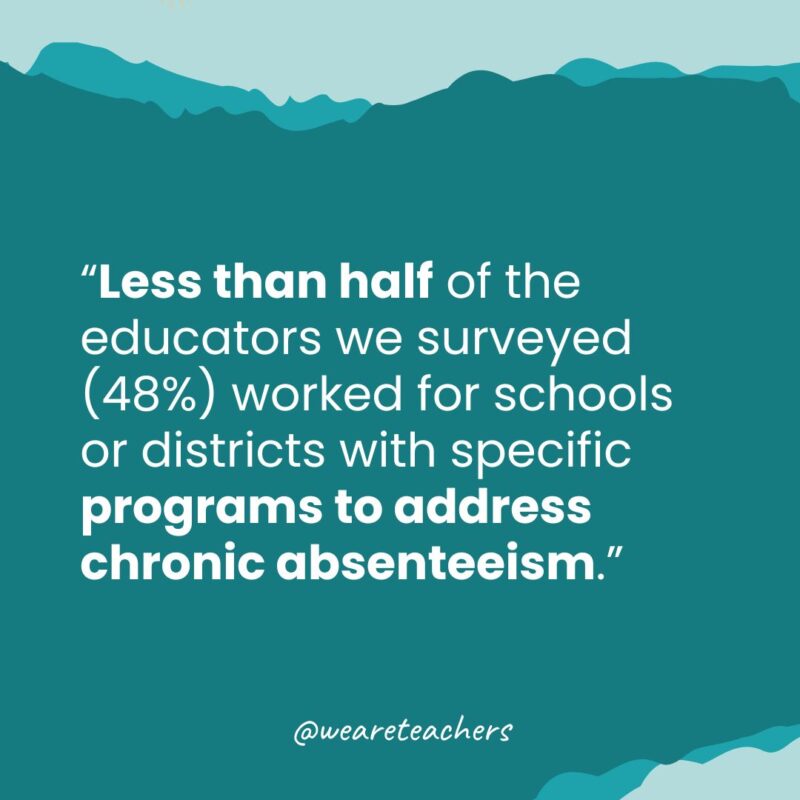
Of the lecturers we surveyed, lower than half labored for colleges or districts that had particular applications in place to handle persistent absence. Lots of these applications merely depend on imposing truancy legal guidelines, although some take a extra distinctive method. These are the concepts that appear to work greatest, with real-life success tales to again them up.
Catch it early and determine the trigger.
Continual absence isn’t at all times a selection. Generally circumstances are outdoors of a household’s management, they usually desperately need assistance. Dad and mom might really feel they will’t management their baby and don’t know who to show to. It would flip on the market are well being points that have to be addressed, transportation points that may be solved, or providers that may assist households in want. Take time to study extra about every chronically absent pupil and their distinctive scenario.
- Success Story: “There was a pupil I labored with that was held again in kindergarten and repeated it once more. He was very sensible however lacked construction and had behavioral points resulting from adjusting to high school once more after lengthy durations of absence. We reached out to the household, reached out to the bus firm, and so on. The most important impression was determining some causes. He had entry to his mother’s telephone and would flip off alarms. They’d miss the bus as a result of the cease was down the road. Collaborating with mother and the bus firm helped transfer the bus cease and elevated his attendance.” —Connecticut speech language pathologist
Develop robust relationships with households and communities.
Again and again, lecturers in our survey confused the significance of creating connections and holding dad and mom accountable for his or her baby’s attendance. Whether or not you’re offering help, explaining the significance of schooling, or determining various schooling choices, open strains of communication are key to creating change occur.
- Success Story: “We had a pupil in sixth grade who refused to get off the bed within the morning. Her anxiousness stored her house. Mother needed to keep away from a struggle, so she would let her keep house. We reached out constantly, stored in touch with Mother and the scholar, however the pupil very practically failed sixth grade. We received our in-house counseling/remedy service concerned they usually helped the scholar and her mother discover acceptable remedy and coping abilities for the anxiousness, a ‘secure’ place right here in school to go when she was feeling overwhelmed, and helped construct her confidence. She is right here nearly daily now—finishing her eighth grade yr.”
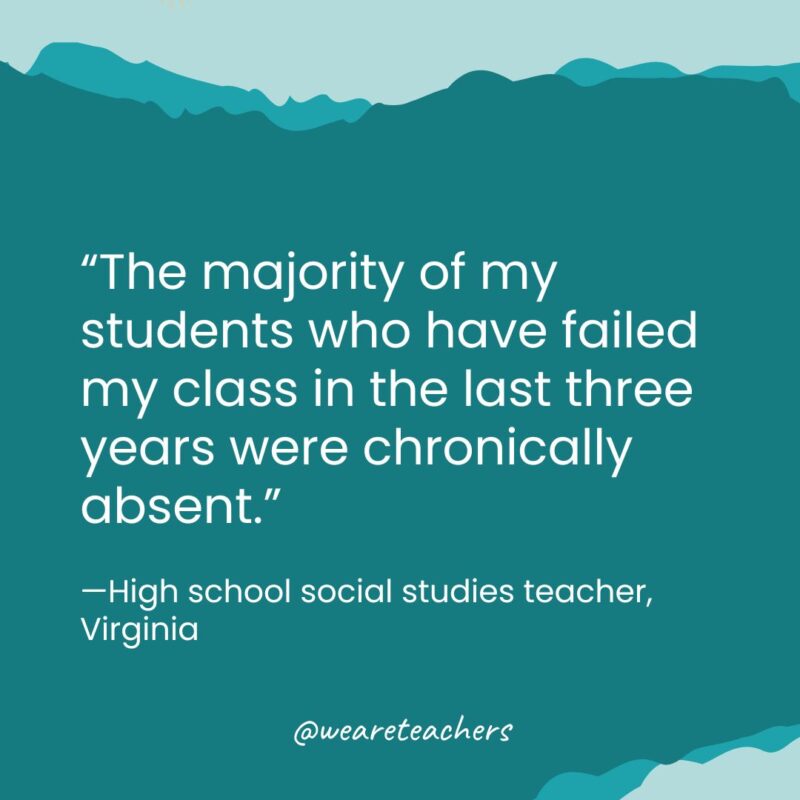
Take away boundaries.
What’s stopping a toddler from coming to high school? Are they afraid of being bullied or lonely and remoted and not using a social group? After they miss the bus, do they not have some other solution to get to high school? Do they lack entry to wash clothes or toiletries? Deal with issues by offering tailor-made options, so college can grow to be a precedence once more.
- Success Story: “Our faculty had a one-year grant that supplied a social employee to satisfy with our at-risk college students and check with households. She would go choose up the scholars from the house if wanted. She made house visits to assist households get wanted help.” —Ohio seventh grade science trainer
Make college a spot college students need to be.
Does your college actively welcome all college students and create a way of group? When college students really feel needed and seen each time they stroll by way of the door (and missed once they don’t), they’re much more more likely to attend repeatedly. Make adjustments to make your college secure, welcoming, and gratifying for all, and persistent absences are more likely to drop.
- Success Story: “I’ve a pupil that was chronically absent final yr that was lackadaisical about after-school actions. He’s now again in my freshman Algebra class once more. He’s additionally in our band. Our band is a top-notch group and our director won’t tolerate persistent absenteeism. They go on journeys to different states—subsequent summer season they’ll Washington, D.C. If they’ve persistent absenteeism, they won’t be allowed to go on the journeys. This pupil by no means misses class this yr. I don’t know if it’s as a result of he’s having to repeat the category or as a result of he’s our lead cymbals participant and others want to him for management. However no matter it’s, it really works.” —Julia Riggs, highschool particular ed math lab trainer
Present lodging and help.
Be inventive when on the lookout for options. Different or on-line colleges will help accommodate variable schedules. When college students fall far behind, guarantee they’ve entry to tutoring and tutorial help to assist get them again on monitor. Search for methods to assist lonely or remoted college students discover buddies amongst their friends—the prospect to see these buddies every day will help them keep in class.
- Success Story: “A pupil was chronically absent and falling behind academically quick and had no buddies. We set them up in a peer-to-peer program the place they turned buddies shortly. The coed started to indicate up daily and shortly caught again up academically.” —Michigan Habits Intervention Ok-8
Provide incentives.
Though some folks balk on the concept of “bribing” children to get them to come back to high school, incentive applications will be very efficient. In case your college’s absentee price is excessive, a program that rewards college students for exhibiting up on time every day will help flip issues round.
- Success Story: “We now have a Attempt for 5 program the place the youngsters are inspired to come back to high school 5 days in a row. If a pupil is in class 95% of the time for the quarter, they get to go on an attendance discipline journey. [More] college students have been coming to high school.” —Michigan Habits Intervention Ok-8
Commit extra assets to the issue.
Lecturers have sufficient on their plates already, so don’t count on them to tackle the heavy lifting in case your college is going through lots of persistent absences. As an alternative, contemplate making a place particularly to handle the issue, like a faculty useful resource officer or attendance monitor.
- Success Story: “Our faculty has an attendance monitor place. … That individual follows up on college students who’re lacking too many days of college or who’ve a sample of lacking college. They make contact with dad and mom to see what we will do to help their baby being in class. They name and even make house visits if wanted. … The attendance monitor will observe up, provide no matter help we could possibly present, like getting the scholar bus transportation, or speaking with the household about any challenges they’re going through in the intervening time. The attendance monitor may even politely remind them concerning the legislation in regard to having children be in class … and {that a} warrant might be issued for his or her arrest.” —Iowa third grade trainer
Implement penalties.
So many lecturers in our survey famous that there didn’t appear to be any actual penalties for his or her chronically absent college students. They nonetheless proceed to be handed from grade to grade, although their abilities are missing. Truancy courts are so backed up that referrals are ineffective. However when college students and oldsters routinely confronted penalties for persistent absence, many educators reported actual enchancment.
- Success Story: “We now have a tribunal system. The scholars and oldsters are required to satisfy with a decide. Within the case of our campus, the decide is a retired college principal. On different campuses, it’s an precise retired decide. These tribunals give the scholars choices and methods to not miss college and achieve success. Their accomplishments are celebrated and if they don’t seem to be making progress, different steps are taken. It is a solution to maintain the scholars out of the truancy courts. It has helped a lot of our college students really make progress in direction of coming to high school and being profitable.” —Marian I., Texas ELAR grades 9-12
Use the system.
In the end, you simply must get the authorized system concerned. It doesn’t at all times work, however for some households, it makes a distinction.
- Success Story: “I had a pupil 3 years in the past who was chronically absent. When he did come to high school, he was usually 1-2 hours late. He would usually sleep in school. His mom didn’t regulate his bedtime, and she or he would usually sleep late. She didn’t see college as a precedence. I known as her and defined how essential it’s that he be in school on time. The counselor known as, and the principal known as. They stated the identical factor. The nurse even known as. Nothing labored. They went to court docket, and she or he was scared by the sum of money she must pay if he was not in school. So, she started to carry him.” —Texas third grade trainer
The place will we go from right here?
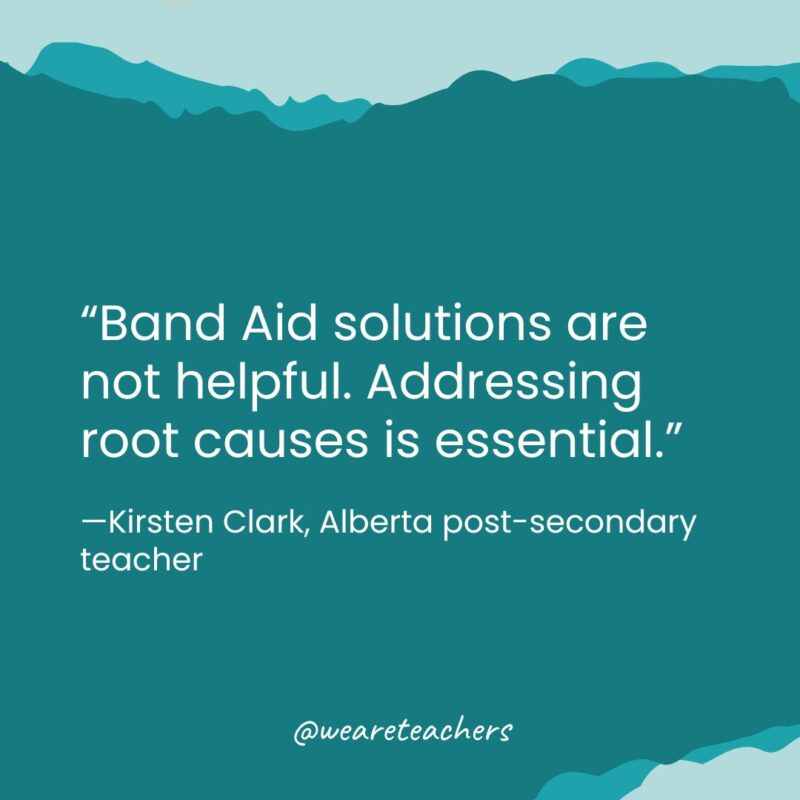
“That is the largest and most difficult impediment to pupil success I’m seeing proper now,” worries Cathy G., a highschool English trainer in Indiana. A Minnesota trainer agrees: “We now have to start out asking the questions of what’s occurring and why. … We’re failing our youngsters in our school rooms.”
It’s time to carry persistent absenteeism to the forefront of schooling discussions, and supply colleges with the assets they should struggle it. Addressing persistent absenteeism takes help from colleges, households, and communities. It requires effort, assets, and other people keen to step in and assist. We will’t resolve the issue for each pupil and each household. However we will definitely do higher, and the time to start out is now.
Lecturers can’t resolve persistent absenteeism alone.
In case your college is able to discover supportive, research-based methods to enhance relationships, routines, and pupil well-being, check out Aware Self-discipline’s skilled studying alternatives.
Plus, examine how pupil apathy is a large downside in colleges.
